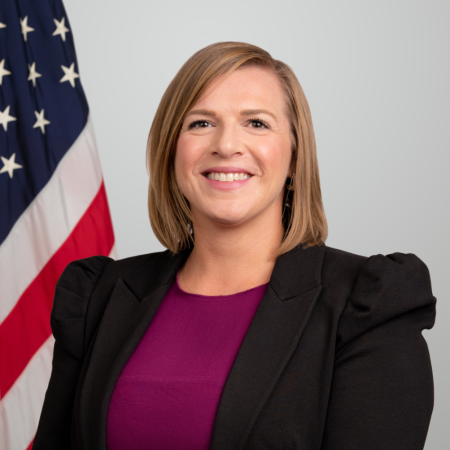World Health Assembly 2024: FDA's Takeaways
FROM A GLOBAL PERSPECTIVE
By Kimberlee Trzeciak
July 10, 2024
Kimberlee Trzeciak is the Deputy Commissioner for the Office of Policy, Legislation, and International Affairs for the U.S. Food and Drug Administration. In this role, she provides strategic policy direction to advance the FDA’s mission and vision of protecting and promoting public health and oversees the agency’s engagement with Congress and global partners and state, local, territorial, and tribal policymakers. Ms. Trzeciak led the Office of Legislation and the FDA’s engagement with Congress, where she and her team advised and assisted Members of Congress, congressional committees, and congressional staff on legislative matters related to the FDA.
She came to the FDA after serving as a senior health policy advisor on Capitol Hill for nearly 15 years and in government relations roles in the private sector before that.
Ms. Trzeciak has a master’s degree in government from Johns Hopkins University and received a bachelor’s degree in public and corporate communication from Butler University.
I recently had the distinct honor of serving on the U.S. delegation at the World Health Organization’s (WHO) 77th World Health Assembly (WHA) where this year's theme was "All for Health, Health for All.” Every year the WHA provides an opportunity for the FDA to support the Secretary of HHS to strengthen relationships, forward U.S. policy goals, and encourage regulatory cooperation between the WHO and its 194 Member States. The U.S. delegation included representatives from the U.S. Department of Health and Human Services and its operating divisions; the U.S. Agency for International Development (USAID); and the State Department.
Collectively, the U.S. government’s priorities included:
- Promoting increased equity in health.
- Encouraging greater transparency and accountability across WHO Member States.
- Advancing discussions on a global health architecture that aligns priorities and investments with impact and results.
- Promoting health care access.
As the FDA representative, I supported the U.S. delegation to advance the FDA’s global public health priorities, including on food safety, medical products supply chain resiliency, emerging technologies, and regulatory systems strengthening. I also had the privilege of representing the U.S. during a WHA committee meeting – delivering remarks to Member States on nutrition, economics of health for all, and the importance of promoting overall well-being. These remarks stressed the importance of maternal and child health, also noting that quality nutrition plays an important role in the survival and wellbeing of all individuals.
There were numerous opportunities for engagement, discussion, and partnership building, with a few standouts I’d like to share with you.
First, I participated in two engaging roundtable discussions. One roundtable addressed potential actions to reduce the harms associated with e-cigarette use, particularly among children. I found it especially interesting to learn about how other countries – including Canada, Finland, France, India, and Singapore – were addressing e-cigarette marketing. They shared policy approaches they were considering, including to help reduce tobacco product use. Tobacco use continues to be the leading preventable cause of disease and death in the United States, and I believe we can learn from other countries on how they are reducing the health burden caused by tobacco.
The other roundtable was on artificial intelligence (AI). Panelists shared ideas on how to harness the potential of AI for public health, while also ensuring we keep a focus on safety, equity, and privacy. The FDA has pioneered innovative regulatory approaches in this area, and I was especially interested in developments across the world on safe and responsible use and development of AI, from medical diagnostics to drug development to enhancing regulatory operations. A shared interest in regulatory parameters to help ensure safety, effectiveness, equity, privacy, and ethical use, was apparent in active efforts across the world. Commissioner Califf has said before that AI is going to play a significant role in changing the way we think about health and healthcare. As this field continues to evolve rapidly, maintaining our global collaborations on scientific and regulatory advancements will only help the FDA better achieve its mission.
I also participated in a bilateral meeting between the U.S. and Ethiopia. Ethiopia recently became the 27th African Union Member State to ratify the treaty establishing the African Medicines Agency (AMA) which is dedicated to improving access to quality, safe, and effective medical products in Africa. I was pleased to inform the Ethiopian delegation, represented by Ethiopia’s Minister of Health, Dr. Mekdes Daba, that the FDA is actively working to open an office in Kigali at the U.S. Embassy in Rwanda, to provide direct support to the AMA. Our meeting included a robust discussion about the amendments to the International Health Regulations, a legally binding agreement among the WHO’s 194 Member States concerning public health emergencies. The amendments, which were adopted by the conclusion of the week-long assembly, build on lessons learned from the COVID-19 pandemic and will enable us to better protect public health at a global level. They would give the WHO additional capacity to detect and help to address potential public health emergencies worldwide.
Finally, the Access to Medicines Foundation, with support from the World Economic Forum, hosted a roundtable on promoting health equity through improved access to life-saving medicines and medical countermeasures in low- and middle-income countries. The roundtable brought together representatives from a few member states, the WHO, and industry to discuss bridging gaps in this area. I mentioned how the FDA’s commitment to harmonization intends to reduce the regulatory burden on industry and helps promote faster, broader access to innovative products. We also encourage regulators and industry to adopt Good Manufacturing Practices to maintain one, high quality standard for all countries to receive safe and effective products.
Overall, the WHA provided an excellent opportunity for the FDA to connect with other countries to exchange ideas, reinforce partnerships, and explore future opportunities for cooperation that can help facilitate change for many global health issues.



